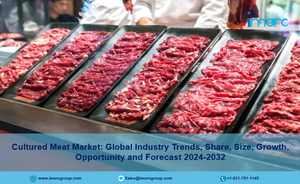Cultured Meat Market Forecast 2024 | Size, Share, Demand and Growth by 2032
Cuerpo
The latest report by IMARC Group, titled “Cultured Meat Market Report by Source (Poultry, Beef, Seafood, Pork, Duck), Application (Nuggets, Burgers, Meatballs, Sausages, Hot Dogs), End User (Household, Food Services), and Region 2024-2032”, offers a comprehensive analysis of the industry, which comprises insights on size, market share, trends, cultured meat market forecast, growth, demand, statistics, and overview. The report also includes competitor and regional analysis, and contemporary advancements in the market.
What is the forecast for cultured meat?
The global cultured meat market size reached US$ 209.1 Million in 2023. Looking forward, IMARC Group expects the market to reach US$ 582.6 Million by 2032, exhibiting a growth rate (CAGR) of 11.8% during 2024-2032.
Factors Affecting the Growth of the Cultured Meat Industry:
- Technological Advancements:
The growth of the cultured meat industry is heavily reliant on breakthroughs in biotechnology, tissue engineering, and cellular agriculture. Continuous research and development are driving the efficiency and scalability of cultured meat production, making it more feasible and cost-effective. Innovations such as bioreactors and scaffolding techniques are crucial for the maturation and texture of lab-grown meat, enabling producers to create products that closely mimic the taste, texture, and nutritional value of conventional meat, thus broadening consumer acceptance and market reach.
- Consumer Awareness and Preferences:
Increasing consumer awareness regarding animal welfare, environmental sustainability, and health concerns associated with traditional meat consumption is significantly influencing the growth of the cultured meat industry. As more individuals seek alternatives that align with their ethical values and health consciousness, the demand for cultured meat is rising. The industry benefits from this shift as cultured meat offers a solution that addresses these concerns, providing a product that reduces the environmental impact, eliminates the need for animal slaughter, and can be engineered to be healthier, potentially with lower saturated fats and enhanced with beneficial nutrients.
- Regulatory Support and Investment:
The regulatory environment and investment landscape play pivotal roles in the cultured meat expansion of the industry. Governmental approvals are crucial for market entry and supportive regulations can accelerate commercialization and consumer adoption. Significant investments from venture capital, private equity, and even traditional meat producers are essential for funding the research, development, and scaling up of cultured meat production. This financial backing fuels innovation and aids in building the necessary infrastructure, conducting consumer education campaigns, and ultimately bringing cultured meat products to the mainstream market at competitive prices.
For an in-depth analysis, you can request a sample copy of the report: https://www.imarcgroup.com/cultured-meat-market/requestsample
Top 11 Cultured Meat Companies:
- Aleph Farms
- BlueNalu Inc.
- Cubiq Foods S.L.
- Finless Foods Inc.
- Future Meat Technologies
- IntegriCulture Inc.
- Meatable, Mission Barns
- Mosa Meat
- New Age Meats
- Shiok Meats
- Upside Foods.
Cultured Meat Market Report Segmentation:
By Source:
- Poultry
- Beef
- Seafood
- Pork
- Duck
Poultry dominates the market as it is widely consumed globally, has a relatively faster and more cost-effective production process in lab settings, and aligns with consumer preferences seeking familiar yet sustainable meat alternatives.
By Application:
- Nuggets
- Burgers
- Meatballs
- Sausages
- Hot Dogs
Based on the application, the market has been divided into nuggets, burgers, meatballs, sausages, and hot dogs.
By End User:
- Household
- Food Services
Food Service sector represent the largest segment as restaurants and catering services are keen to innovate their menus with sustainable and ethical options, attracting consumers interested in trying cultured meat in a familiar dining context before mainstream retail adoption.
Regional Insights:
- North America (United States, Canada)
- Asia Pacific (China, Japan, India, South Korea, Australia, Indonesia, Others)
- Europe (Germany, France, United Kingdom, Italy, Spain, Russia, Others)
- Latin America (Brazil, Mexico, Others)
- Middle East and Africa
Asia Pacific's dominance in the cultured meat market is attributed to the region's rapid urbanization, growing middle-class population with increasing disposable income, high demand for meat consumption, and significant investments in food technology innovations, alongside a strong interest in sustainable and alternative protein sources.
Global Cultured Meat Market Trends:
The global cultured meat market is experiencing significant growth, driven by advancing biotechnological methods and growing consumer interest in sustainable alternatives to conventional meat. Innovations in cellular agriculture are enabling the production of meat that replicates the taste, texture, and nutritional profile of traditional meat, without the environmental footprint associated with livestock farming. There is a notable shift toward diversifying product offerings, with companies developing a variety of cultured meat products, including beef, poultry, and seafood. This trend is supported by increasing investments from stakeholders aiming to meet consumer demand for ethical, environmentally friendly, and health-conscious options, thereby reshaping the future of food.
Ask Analyst for Customization: https://www.imarcgroup.com/request?type=report&id=5802&flag=C
Note: If you need specific information that is not currently within the scope of the report, we will provide it to you as a part of the customization.
About Us
IMARC Group is a leading market research company that offers management strategy and market research worldwide. We partner with clients in all sectors and regions to identify their highest-value opportunities, address their most critical challenges, and transform their businesses.
IMARC’s information products include major market, scientific, economic, and technological developments for business leaders in pharmaceutical, industrial, and high-technology organizations. Market forecasts and industry analysis for biotechnology, advanced materials, pharmaceuticals, food and beverage, travel and tourism, nanotechnology, and novel processing methods are at the top of the company's expertise.
Our offerings include comprehensive market intelligence in the form of research reports, production cost reports, feasibility studies, and consulting services. Our team, which includes experienced researchers and analysts from various industries, is dedicated to providing high-quality data and insights to our clientele, ranging from small and medium businesses to Fortune 1000 corporations.
Contact Us:
IMARC Group
134 N 4th St. Brooklyn, NY 11249, USA
Email: sales@imarcgroup.com
Tel No:(D) +91 120 433 0800
United States: +1-631-791-1145 | United Kingdom: +44-753-713-2163












Comentarios